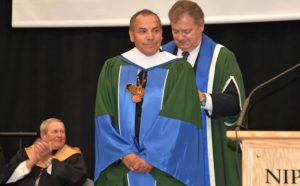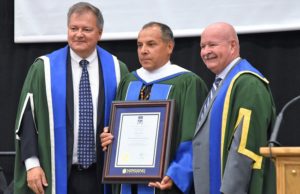Retired OPP officer and Indigenous advocate receives honourary degree

By Kelly Anne Smith
NORTH BAY—Nipissing University bestowed its highest distinction of an honourary degree upon a Nipissing First Nation citizen who strives to lift others up.
George Couchie walked across the stage June 7 at the convocation ceremony with proud family watching. Graduating nurses witnessed Couchie receive an honourary degree from Nipissing University President and Vice-Chancellor Dr. Mike DeGagné. It was a joyous event for Couchie.
“He has done fantastic work throughout Canada so it was an honour to be asked by Doctor DeGagné. Showcasing and bringing forth Aboriginal issues is a good thing.”
Former North Bay Police Service Chief Paul Cook, now the university’s chancellor, introduced Couchie as his dear friend.
“I really have to thank him. He probably helped bring it forward.”
And Dr. Cindie Peltier, the Chair of Indigenous Education, read with pride of Couchie’s many accomplishments. She is George’s cousin.
Couchie lives on Nipissing First Nation with his wife Carolyn and family. Couchie’s spirit name is Zoongiday, which means ‘strong heart’ in Anishinaabemowin, and he belongs to the Red-tailed Hawk Clan or Gibwanasii.
A popular handbook, Raised on an Eagle Feather, was penned by Couchie to educate on Anishinaabe ways. In it, his wife Carolyn Couchie writes that over the years she has watched George,”… use his natural kindness and grace to help others overcome their obstacles and seek out the wisdom of Elders along his own path.”

A former national powerlifting champion, Couchie continues the heavy lifting to better society. He is a retired Ontario Provincial Police (OPP) officer who has never been busier. On forces for 33 years, he also designed and delivered a Native awareness training program, Walking the Path. He continues to offer cultural training through Redtail Hawk Training & Consulting. He also runs an award winning cultural youth camp called Niigan Mosewak — which means “moving forward” in Anishinaabowin. He aims to build essential skills in youth to drive social change.
Couchie is gearing up to run three week-long camps this summer – one in July and two in August. The Niigan Mosewak Program is for Indigenous youth aged 12-17. Close to 150 kids are invited to the culture camp that delivers powerful messages of hope by encouraging positive and healthy lifestyle choices.
Couchie says he wishes he had such a camp to go to when in his youth.
“It motivates me that way. Plus, my son had gone to the camp and now, it’s my grandchildren that are starting to go. That’s another motivation to keep going.”
“In policing, we are meeting people at the worst of times. For these kids, some of them come with baggage. But it’s teaching them about our culture, our history, and having them make some attachments.”
Couchie explains that youth mentors, especially experienced mentors, are integral to the camp.
“A great thing that we didn’t think would happen is the kids can’t wait for pow wow season. Then they get to meet up with other kids from the camp from other reserves. They are so excited they have friends all over Ontario.”
Couchie says it is essential to have kids connect earlier on in life.
“When you hear people with addictions talk about what finally got them off addictions, it is a connection to their culture, or their religion or their family.”
Speaking out to the new nurses about to take to the stage for their own diplomas, Couchie talked about the spark that we carry in each of us. He says to never put alcohol, drugs or poison on your spark.
“When I was a kid, it was all about poison and alcohol in our community. In order to talk about it, I needed to understand my brokenness when it came to alcoholism in my family. We need to give kids direction not to put poison in our body. We need to live the good life.”


